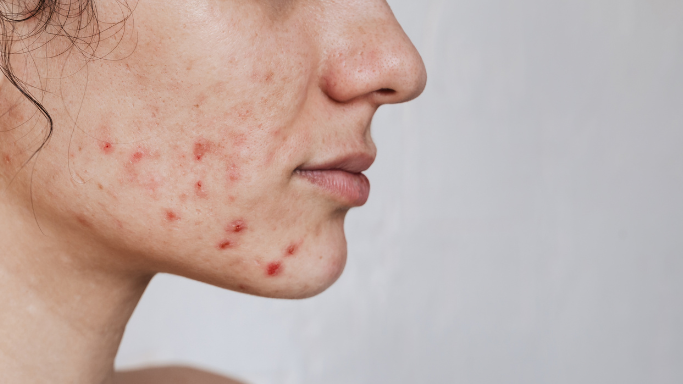Are you struggling with adult acne? — half of adults face the challenge of persistent acne beyond their teenage years. At our practice, we'll explore the causes of adult acne and effective strategies to manage it effectively. In this blog, we delve into the causes, psychological effects, and effective management strategies for adult acne, with a focus on the emerging field of neurocosmetics.
What Causes Adult Acne?
Adult acne occurs due to blocked sebaceous glands from excess sebum, dead skin cells, bacteria, and debris, leading to inflammation. These are the crucial triggers of adult acne.
- Hormonal changes
- Stress
- Skincare products
- Diet
- Genetics
Neurocosmetics: A Novel Approach to Managing Adult Acne
Neurocosmetics is an emerging field that examines the interaction between skincare products and the nervous system. These formulations target neural pathways to not only improve skin appearance but also reduce inflammation and calm the skin. In treating adult acne, neurocosmetics focus on reducing inflammation, controlling sebum production, and fortifying the skin barrier. Key benefits include soothing acne-related inflammation, regulating oil levels to prevent clogged pores, and enhancing the skin's resilience against external irritants by strengthening its protective barrier.
Tips to Reduce and Control Adult Acne:
- Consistent Skincare Routine: Wash your face gently twice a day to remove dirt and excess oil without stripping your skin of its natural moisture. Avoid over-washing, which can irritate your skin and worsen acne
- Use Non-Comedogenic Products: Choose skincare and makeup products labeled “non-comedogenic” to ensure they won’t clog your pores. This helps prevent new breakouts from forming.
- Moisturize Daily: Keep your skin hydrated with an oil-free, non-comedogenic moisturizer. Even oily skin needs moisture to stay balanced and prevent overproduction of oil.
- Avoid Touching Your Face: Touching your face can transfer oil and bacteria from your hands, leading to more breakouts. Be mindful to keep your hands away from your face as much as possible.
- Keep Hair Clean and Away: Oils from your hair can transfer to your face and cause acne. Keep your hair clean and try to keep it away from your face, especially if it's oily.
- Change Pillowcases Regularly: Pillowcases can collect oil, dirt, and bacteria from your skin and hair. Change them at least once a week to prevent them from contributing to acne.
- Stay Hydrated: Drinking plenty of water helps your skin stay hydrated and healthy. It also helps flush out toxins that can contribute to acne.
- Eat a Balanced Diet: Some foods, especially those high in sugar and dairy, can trigger breakouts. Focus on a balanced diet with plenty of fruits, vegetables, and lean proteins to support clear skin.
- Manage Stress: Stress can cause your body to produce more hormones that lead to acne. Practice relaxation techniques like meditation, yoga, or deep breathing to help manage stress levels.
- Don’t Pick Pimples: Popping pimples can cause scarring and spread bacteria, leading to more breakouts. Leave them alone to heal naturally.
- Use Sunscreen Daily: Protect your skin from sun damage with a non-comedogenic, oil-free sunscreen. Sun exposure can worsen acne and cause hyperpigmentation.
- Choose Neurocosmetic Products: to enhance your skincare routine with anti-inflammatory neurocosmetics, brands like AME ORGANICS could provide beneficial options
- Consult a Dermatologist: If over-the-counter treatments don’t work, see a dermatologist. They can prescribe stronger medications or suggest treatments like chemical peels or laser therapy.
- Get Enough Sleep: Aim for 7-9 hours of sleep per night. Proper sleep helps regulate hormones and reduces stress, both of which can improve your skin health.
Conclusion
Understanding the causes of adult acne and incorporating neurocosmetics into your skincare routine can significantly improve acne management. By adopting these tips and strategies, you can take proactive steps towards achieving clearer, healthier skin and boosting your confidence.


1 comment
Very good information thankyou ame❤️